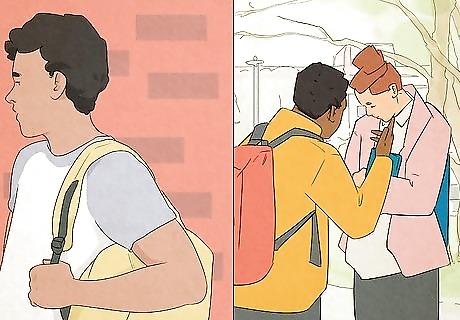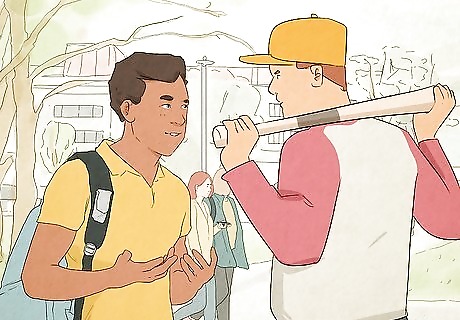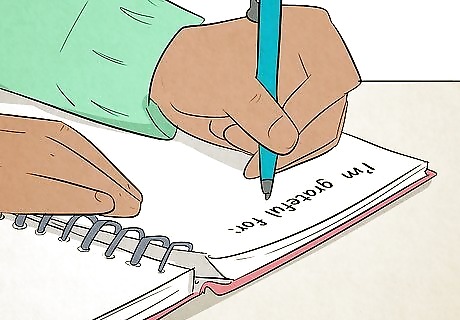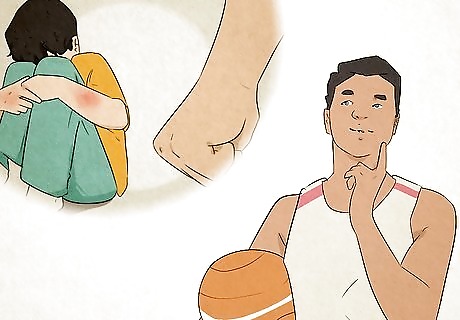
views
- Stand up to the bully with unemotional language, and don't let them see how much they affect you. If all else fails, just ignore them and walk away.
- Enlist the help of your friends and travel in groups to stop bullies from approaching. Get help from a trusted authority figure, too.
- Build up your self-confidence and learn to manage your stress so you don't feel overwhelmed or depressed. You'll get through this—it just takes time.
Deflect the bully with humor.

Laugh it off to show the bully they can't control your emotions. When a bully starts bothering you, take a deep breath and start laughing. Laugh at everything they say—the worse the insult, the harder you should chuckle. After laughing, simply turn around and walk away without adding anything else. This tactic frustrates bullies because they want you to cry, not laugh. Try to think of it as something hilarious and actually laugh, or imagine something genuinely funny to you, so your laugh sounds more natural. Don't make jokes at your own expense, however. That'll only add fuel to the fire and give them something else to pick on you about.
Avoid the bully as much as possible.

When your bully doesn't see you, they won't bully you. Try to avoid them in school and social situations. Steer clear of places you know they hang out, and if they take the same route that you do, opt for a different path, so you're not sharing the same space at any point. As the saying goes: out of sight, out of mind! Try your best to avoid them without letting them know you're doing it. They might interpret that as fear and become even more of a bully.
Ignore the bully and walk away.

Pretend you can't hear and deny them the satisfaction of getting to you. Do your best not to show any reaction in front of the bully—just walk away if you can. Bullies want attention and gain satisfaction from making others feel hurt or uncomfortable, so reacting to them will only encourage them further. Ignore them and deny them any power over you, and they'll soon get bored. As you walk away from your bully, imagine you're walking away from a complete stranger instead. In their eyes, you'll seem more calm and unbothered by their antics. There's no point talking to someone who is acting irrationally. That's why an easy way to preserve your dignity and deal with a bully is to say, "I don't have time for this," and leave.
Stand up for yourself.

Gather your courage and firmly tell the bully, "no." When a bully approaches you, stand tall and be brave—or pretend, even if you don't feel brave. Loudly and confidently say, "No! Stop it," to them, and then walk away. Similarly, if you see a bully bothering someone else, tell the bully to stop and then walk away with the other person in a show of support. Try a sassy comeback line like, "Whatever," "Why are you talking to me?" “Hey, that’s not funny,” and "Here we go again. Can we move on already?" Act brave and confident through your body language and posture. Keep your back straight and your head high without fidgeting. If you’re a parent, help your child practice good comebacks. Make a list of responses and play out different scenarios with them so they’re prepared the next time a bully bothers them.
Use neutral language to describe the bully’s actions.

Unemotional language makes it easier to talk without getting upset. When your bully says mean things, repeat what they said and explain why it's not cool for them to talk like that. Use neutral language to make it clear that you're not getting worked up—just stating facts. It shows the bully that you know what they're trying to do, and you won't let them take your power away or turn you into a victim. For example, if your bully insults you, you could say, "You just said my clothes are ugly. That's not helpful, and it's not okay to talk to me like that."
Distract yourself from the bully.

Use distraction tactics so the bully can't see how you really feel. One good tactic is to count down from 100 until you're somewhere safe. This way, you won't react to whatever your bully says because your mind is focused on something else. Come up with a distraction plan that works for you, whether counting, spelling or singing a song in your mind. For example, you could recite the lyrics of your favorite song to yourself. Alternatively, you could try spelling your first and last name backward and then your parents' names to keep your brain busy.
Stick close to your friends.

Bullies are less likely to pick on you when you're not alone. Did you know that bullies mainly go after people who are by themselves? In a bully's mind, one person is easy to conquer—but a whole group is too much work. Hang out with your friends as much as possible and travel in pairs (or groups) each day. The more time you spend with others, the less your bully will target you. If the bully does try to approach you while you're with friends, simply turn the group around and walk away. Talk to your friends about what you're going through, too. Help them understand your feelings about the situation, and let them look out for you. That's what friends are for!
Report the bullying to an authority figure.

Tell an adult that you trust so they can help you deal with your bully. It can be nerve-wracking to tell someone else about your situation, but speaking to a trusted adult will make you feel less afraid. In addition, it's crucial to tell someone if you're in danger of physical harm from your bully. Try talking to your parents, a favorite teacher, a guidance counselor, or a school psychologist. Explain what's happening, who's involved, and how long it's been going on. Then, ask what they'll do to help stop the bully. If the adult you first talk to doesn't do enough, go and tell someone else. Don't give up until you find an adult willing to step in and help. As a parent, try keeping an open line of communication with your child. Use a calm and compassionate tone so they feel comfortable coming to you, and check in with them daily to ask how things are going.
Practice self-affirmations.

Recite affirmations and remind yourself to be proud of who you are. Build up your self-confidence to withstand a bully's mean remarks. It's important to be proud of yourself and love yourself no matter what! Practice daily self-affirmations, reminding yourself of all your strengths, talents, and positive qualities. Eliminate negative self-talk too, and say only kind things to yourself. Challenge negative beliefs and replace them with better ones. For example, change "I can't do this" to "I am strong and capable. I can overcome any challenge, including this one." Everyone has an inner strength to draw on. Bullies try to make you feel like you're weak, but it's not true. You have the strength to get through this! Parents can help their kids build confidence. Encourage your child to try new hobbies that make them happy, reward them for their progress—and above all, remind them how much you love them.
Stay positive.

Resist the urge to insult your bully and sink down to their level. While you can definitely call someone out for bullying and find holes in their argument, never resort to behavior like theirs. That's just another way of giving them power. Instead, spend time each day reflecting on the things you love and are grateful for to get yourself in a positive headspace no matter what the bully says. Try keeping a gratitude journal. Every day, write down a list of things you're grateful for to remind yourself of all the good things in your life. You can be grateful for anything, no matter how small. Be sure to appreciate your qualities, too—take note when you make an accomplishment, or help someone else in need.
Manage your stress.

Stress-relieving techniques can make bullying feel less overwhelming. Develop ways to eliminate stress that work for you, whether you exercise, listen to music, do a favorite activity, or vent your troubles to a friend. Stress can mess up your physical health and make a bully's job easier, so work on minimizing stress in your daily life. For example, you could go for a jog or take your dog for a long, calming walk. Play music on a speaker and have a quick dance party—either solo or with friends. Enjoy your favorite video game for a couple of hours or spend some time drawing if you like art. If you’re a parent, make sure your home always feels like a secure and loving place for your child—a retreat they can use to relax and unwind.
Consider the bully from a new perspective.

Bullies are unhappy people who take out their frustrations on others. When bullies feel bad, they lash out because they want everyone else to feel as bad as they do inside. However, a single mean bully isn't worth your time or mental energy in the long run. Once you can see the situation from that perspective, it's easier to see that your troubles will pass. In fact, your bully's actions might not have anything to do with you. Something personal might be going on in their life, so they need a punching bag to take their anger or sadness out on, and unfortunately, it is you.
Help other people with their bullies.

Stop the cycle of bullying by being an ally to other people. Bullies are people who try to make themselves look good. All they want is attention; take that away from them, and they have nothing. Since you've experienced bullying, you know how it can hurt and how to help others. Use some coping techniques above to help the people around you and yourself. Help others see bullies for who they really are; sad and angry people who tear others down to feel better. Go with them to report their problem for moral support. Let this other person borrow your strength and confidence if they're not feeling it themselves. As a parent, encourage your child to take action if they see a peer being bullied. Ask them how they’d feel if someone defended them so they understand how much of a difference they can make just by being kind.


















Comments
0 comment